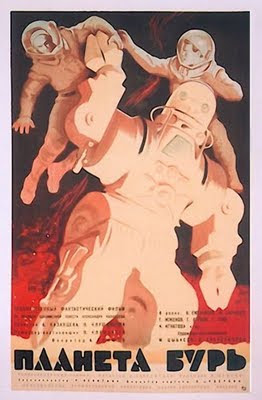Midway through watching the Roger Corman produced space adventure, Voyage to the Prehistoric Planet (1965, dir. Curtis Harrington), one develops an increasingly odd sensation: the effects seem strangely dated for the year (even for a low budget film), the plot weirdly disconnected, like a series of events strung together with little sense of development - strands are built up, as though they are about to lead somewhere, and then just peter out. And why is the voice-dubbing so off? And is that Russian writing on the side of the spaceship?
Indeed, almost the only thing holding it all together is Ronald Stein's equally uncanny music. Stein was assistant musical director St. Louis Municipal Opera in the early fifties, and married the opera singer Harlene Hiken (who provided the singing voice of Audrey Dalton in a western of the same year, called The Bounty Killer). For several years, Stein served alongside Les Baxter as staff composer at American International Pictures, but though they share credits on numerous films, Baxter claims they never met. With its silken exotica and fleeting electronics, Stein's music for Prehistoric Planet could almost be mistaken for Baxter's at times.
It turns out, Voyage to the Prehistoric Planet was almost entirely composed of footage from an earlier soviet film, Planeta Bur ('Planet of Storms') from 1962, with the story recomposed and scenes re-arranged with the help of a couple of extra scenes starring Basil Rathbone (who would star alongside Dennis Hopper in Harrington's vampires in space flick, Queen of Blood, released the following year). Planeta Bur was directed by Pavel Klushantsev, who shot to fame in Russia when his (1958) Doroga K zvezdam ('Road to the Stars') happened to coincide with the launch of Sputnik.
It doesn't end there though, for the same footage was used one further time, in 1968's debut feature from Peter Bogdanovich (under the alias Derek Thomas), Voyage to the Planet of Prehistoric Women, with Rathbone now replaced with Howard Hughes's former squeeze, Mamie van Doren. Prehistoric Planet now reveals itself as the incoherent, "primordially repressed" middle part of a three-stage fantasy, as in Freud's 'A Child is Being Beaten' - caught between the hard SF of the original Soviet film, and the explicit sexual fantasy of the Bogdanovich version.

In this context, we can now begin to make sense of one of the most troubling aspects of Voyage to the Prehistoric Planet: the suggestive, disembodied voice the astronauts keep hearing as they explore Venus, a tremulous electronic portamento which, as one of the men remarks, "Sounds like a woman. . . or a monster!" Throughout the story, this voice teases the astronauts and audience alike, one constantly expects it to lead somewhere - but it never does. We never really discover its source as the story just sort of peters out. Absent entirely from the original Russian film, and only finally embodied in the third version - here it remains a perfect example of one of Melanie Klein's disembodied partial objects, haunting the spectral soundtrack of the film, and somehow all the more alluring for it. Like a leitmotif from Tristan and Isolde, it constantly resists resolution - to the point of a sado-masochistic impulse that cannot fully annunciate itself, precisely as in the repressed middle term, "Father is beating me."
